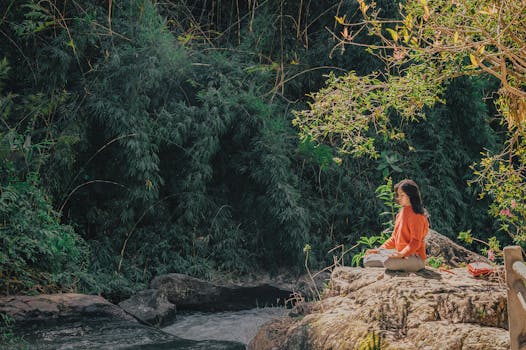
Unlock Inner Peace: Your Journey to Mindfulness & Meditation
Are you feeling overwhelmed by the constant demands of modern life? Do you crave a sense of calm and clarity amidst the chaos? Mindfulness and meditation practices offer a powerful pathway to inner peace and well-being. This article explores the profound benefits of these ancient techniques and provides a practical guide to integrating them into your daily life. Learn how to cultivate present moment awareness, reduce stress, and unlock your inner potential through the transformative power of mindfulness and meditation.
What is Mindfulness?
Mindfulness is the practice of paying attention to the present moment without judgment. It's about observing your thoughts, feelings, and sensations as they arise, without getting carried away by them. Instead of dwelling on the past or worrying about the future, mindfulness anchors you in the here and now. This simple yet profound practice can transform your relationship with yourself and the world around you.
The Science Behind Mindfulness:
Numerous scientific studies have demonstrated the remarkable benefits of mindfulness. Neuroimaging research shows that regular mindfulness practice can:
- Reduce activity in the amygdala: This brain region is associated with fear and anxiety, so decreased activity contributes to reduced stress and emotional reactivity.
- Increase gray matter density in the hippocampus: The hippocampus plays a crucial role in learning and memory, suggesting that mindfulness can enhance cognitive function.
- Boost activity in the prefrontal cortex: This brain region is involved in executive functions like attention, decision-making, and emotional regulation.
- Mindfulness meditation: Focusing on the present moment experience without judgment.
- Transcendental meditation (TM): Using a personalized mantra to quiet the mind.
- Guided meditation: Following a guided audio or video to focus your attention.
- Walking meditation: Paying close attention to the sensations of walking.
- Loving-kindness meditation: Cultivating feelings of compassion and love.
- Reduced stress and anxiety: Mindfulness helps you detach from stressful thoughts and emotions.
- Improved focus and concentration: Regular meditation strengthens your ability to concentrate and maintain attention.
- Enhanced emotional regulation: You become better equipped to manage difficult emotions.
- Improved sleep quality: Mindfulness and meditation can promote relaxation and improve sleep patterns.
- Increased self-awareness: You gain a deeper understanding of your thoughts, feelings, and behaviors.
- Greater empathy and compassion: Mindfulness cultivates feelings of connection and compassion towards yourself and others.
- Improved physical health: Studies have linked mindfulness to lower blood pressure, reduced chronic pain, and improved immune function.
- Start with short sessions: Begin with 5-10 minutes of meditation each day and gradually increase the duration as you become more comfortable.
- Find a quiet space: Choose a quiet and comfortable place where you can relax without distractions.
- Use a guided meditation app: Many apps offer guided meditations for beginners.
- Incorporate mindfulness into your daily activities: Practice mindfulness while eating, walking, or showering.
- Be patient and kind to yourself: It takes time and practice to develop mindfulness skills. Don't get discouraged if your mind wanders – simply gently redirect your attention back to your chosen focus.
These changes in brain structure and function translate into tangible improvements in mental and physical health.
What is Meditation?
Meditation is a core practice of mindfulness. It involves focusing your attention on a single point of reference, such as your breath, a mantra, or a visual image. The goal is to quiet the mind’s incessant chatter and cultivate a state of deep relaxation and awareness. There are many different types of meditation, including:
Benefits of Mindfulness & Meditation:
The benefits extend far beyond stress reduction. Regular practice can lead to:
How to Incorporate Mindfulness and Meditation into Your Life:
You don't need to dedicate hours each day to experience the benefits. Start small and gradually increase your practice:
Mindfulness for Everyday Challenges:
Mindfulness is not just for relaxation; it’s a powerful tool for navigating everyday challenges. When faced with stressful situations, take a few deep breaths and bring your attention to the present moment. Notice your thoughts and feelings without judgment. This simple act can help you respond to challenges with greater clarity and composure.
Conclusion:
Mindfulness and meditation are invaluable tools for enhancing your well-being. By cultivating present moment awareness and quieting the mind, you can unlock inner peace, reduce stress, and live a more fulfilling life. Start your journey today and discover the transformative power of these ancient practices. Remember to be patient and kind to yourself as you embark on this journey towards a more mindful and peaceful existence.

